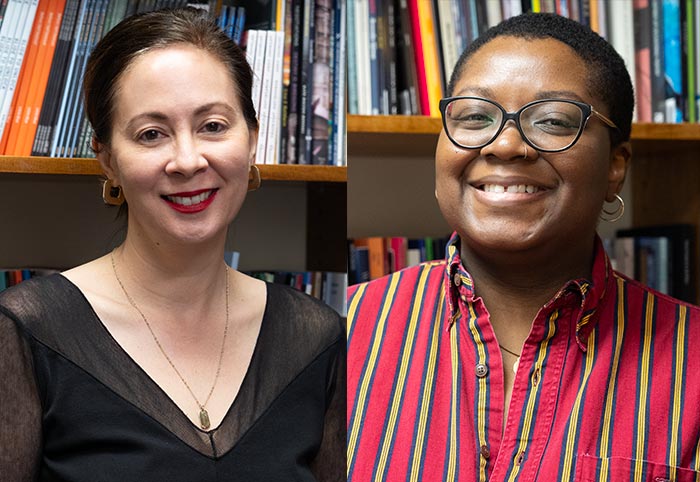CGU honors 2024 Tufts poetry award winners

2024 Kingsley Tufts Poetry Award winner Paisley Rekdal, left, and Jacqui Germain, recipient of the Kate Tufts Discovery Award. Courier photo/Andrew Alonzo
by Andrew Alonzo | aalonzo@claremont-courier.com
Claremont Graduate University hosted Paisley Rekdal and Jacqui Germain at Pasadena’s A Noise Within Theater Thursday for its 2024 Kingsley and Kate Tufts Poetry Awards Reading and Reception.
Rekdal, a 53-year-old University of Utah professor and director of the school’s American West Center, won the Kingsley Tufts Poetry Award, and its $100,000 prize, for her 2023 book,“West: A Translation.” Kate Tufts Discovery Award honoree Jacqui Germain, 33, is a freelance journalist, poet and author. The Kate Tufts prize, which honors a “first book by a poet of unusual promise,” comes with a $10,000 prize.
Rekdal, a Salt Lake City resident, is a three time Tufts Award finalist. “Anytime you get an award, it’s a bit of a shock to be honest,” she said. “I’m very proud, specifically for this book because it’s such a weird book … Like, it’s a very deeply weird book.”
Utah’s Poet Laureate at the time, Rekdal was commissioned in 2018 to write “West: A Translation” ahead of the 150th anniversary of the completion of the Transcontinental Railroad. Of Norwegian and Chinese descent, Rekdal said she wanted to honor both her ethnicity and the descendants of workers, whom she discovered felt shortchanged by history.
She found that none the project’s Chinese workers’ writing from the period had been saved. After more research into the railroad’s history, she came across a Chinese poem remembering the dead that had been carved into a wall at San Francisco’s Angel Island Immigration Station.
Going character by character, she used the elegy as inspiration, ultimately writing 44 poems that tell the workers’ story. “West: A Translation” is accompanied by an interactive website, westtrain.org, with video poems and other resources related to the book. The book was published by Canyon Copper Press in May 2023 and was on the 2023 National Book Award longlist.
Rekdal said she wasn’t sure if “West: A Translation” would even qualify as a book of poetry since half are documentary verses not set in her voice. She equated the book’s recognition as a Tufts winner to being a DJ, saying “I just put together an album of sounds and sent it out in the world.” She views poetry the same way a concertgoer interprets a song, “a confluence of elements that create a unifying meaning,” she said. “I think most language is there to communicate ideas, but poetry is there to make language the event.”
The Tufts accolade won’t alter her approach, Rekdal said. She has had a hunger to write since high school, she said, adding that it’s how she processes the world.
Rekdal will soon head back to Utah to resume teaching. She’ll continue to draw inspiration from what she calls her “little book of death,” which contains a list of questions she’d like to answer before her own date with mortality.
Germain said she was shocked to learn she had won the Kate Tufts Discovery Award for “Bittering the Wound,” which was published in 2022 by Autumn House Press.
“I feel really grateful to be considered in the company of so many folks that I think are really genuinely thinking differently about poetry and form and craft and audience and intention,” said the St. Louis, Missouri resident.
Through its 35 poems “Bittering the Wound,” delves into Germain’s first-person experiences during the 2014 Ferguson, Missouri unrest that followed the police shooting of Michael Brown. While she jotted a few poems during that period, it wasn’t until years after that Germain was able to make sense of the experience. Through repetition and rewrites as well as a crashed laptop — most of her initial drafts were written by hand — Germain constructed her manuscript.
“I wanted to take my time in order to do it justice, ‘cause it very much felt like a thing that was certainly speaking to a singular experience but was written as a way to remind all of us that it was a very intimate experience for folks in St. Louis,” Germain said. “I think one of the things that I really struggled with — and I think a lot of folks in St. Louis kind of struggled with when it came to the uprising — was being very aware of folks who were not from St. Louis talking about the city or talking about its people or talking about our communities and getting things wrong.
“For this book, I think I was very much writing for folks in St. Louis who experienced it with me,” she said. “I wanted to make a kind of reader … very aware that there’s a degree of interiority that they couldn’t access.”
Germain said she was not focused on literary technique when crafting “Bittering the Wound,” but was aware of her audience since part of the book “was a reaction to a specific gaze that I was writing sort of against.”
Like Rekdal, she said the Tufts prize will not change how she works. She too began writing poetry in high school. She honed her craft doing poetry slams and learning from others while at the Washington University in St. Louis. For Germain, poetry gives one freedom with language and encourages readers to lean into the unknown.
Germain will soon return to Missouri to resume her work as a poet, author, and freelance journalist.
This year’s Tufts judges included Ellen Bass, Carmen Giménez, Diana Khoi Nguyen, Lynne Thompson, and 2022 Kingsley Tufts Poetry Award winner Divya Victor.








0 Comments